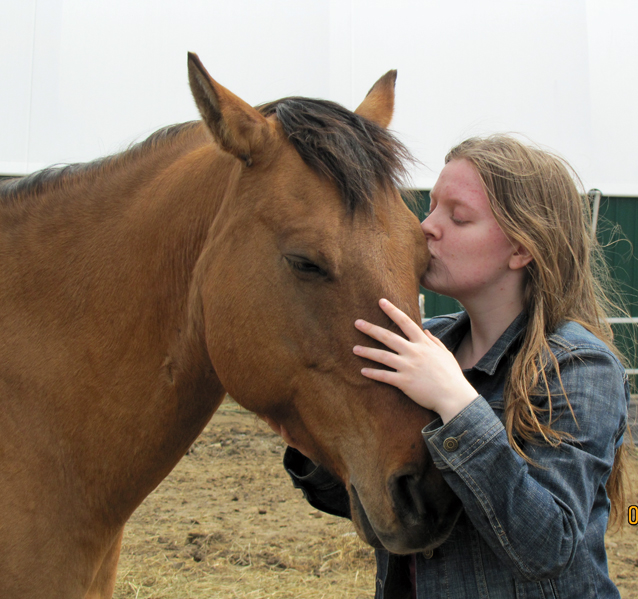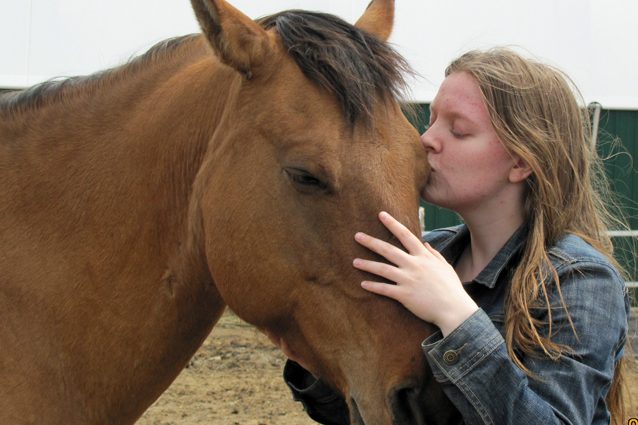CFN – This Column of “Spirits in Unity” is being published by CFN for the community of Stormont, Dundas & Glengarry. It is an honour to have you as a reader. I welcome any comments, questions or topics you would like me to discuss. I hope you enjoy reading about the wonderful world of horses and the impact that natural horsemanship can have in making it a better world for both horses and humans.

“Do you want to be a live chicken or a dead duck?”
You will be a horseman when you have fallen off a horse a hundred times. Hogwash. You may have heard that old chestnut before, but it is like a lot of other things with horses and instructors. It is not based on anything that has any validity.
I first heard this statement nine years ago when a mother brought her daughter to our facility and told me that her daughter had fallen off a horse a total of 72 times. At first I thought that this was some kind of horse tale and a bit of an exaggeration. But I found out that it wasn’t, because her daughter had logged every incident in her journal convinced by her instructor that when she reached that magic 100 falls, all would be well.
In her final lesson, she came off the horse five times, each time getting successively more severe until he mother stepped in and said, “Enough is enough”. Even after all of this, her daughter’s trust in her instructor was still unshaken. And fortunately her love of horses was not shattered. But her confidence was understandably shaken.
I agreed to take her daughter on as a student. My first goal was to help her regain her confidence.
Improving Your Confidence
Around horses even the most confident people can become insecure partly because of their own inexperience and partly because they don’t know how to help this large prey animal to feel more secure. Even the most professional of animal trainers will tell you that of all animals, horses are the most difficult to train. But don’t despair, because all of us can hope to achieve success with horses if we understand how to develop confidence in ourselves and our horses.
In horses and humans there are two levels of confidence, those who are the ‘brave’ ones who also think that everyone is brave and then you have the timid ones who will tend to do whatever their instructor tells them even if every fibre in their body is screaming against it.
The consequences are never good and sometimes dangerous. The timid person doesn’t learn how to gain confidence. Your thousand pound prey animal needs you to be confident (the brave one).
Pat Parelli advises to “Defend your boundaries to defend your dream.
Physical injuries can heal, but once your confidence is shattered it can take a long time to get it back. I have seen people take as long a five years to regain enough confidence just to get back on a horse after a serious incident and not from the physical injury but from the psychological injury.
If you lose your confidence you can lose your dream with horses, you’ll do less with your horse, you will make excuses, you’ll stop riding, or even get out of horses altogether and all because you let someone talk you into something that you didn’t feel right for you.
Feeling fear is sometimes referred to the ‘action response system’. All animals have it, but only humans seem to have the ability to over-ride it. Fear has to be honoured. Those instincts are there to keep you safe. If you don’t listen to your own instincts, why would you listen to someone else? Even if they do know more that you, it doesn’t give them the right to push you into anything. When you feel afraid or unsure you need more preparation not more encouragement, ridicule or force.
The first step in building your confidence means you should not do anything you don’t feel ready for and that doesn’t feel right to you. Honouring your instincts will keep you safe.
How to know you’re NOT ready
You know you are NOT ready when: when you aren’t excited about it, when you get butterflies in your stomach, when you start thinking up excuses, or when your little voice in your head is saying, “They are going to think I am a wimp.”
What to do when someone is bullying you
When someone tries to get you to do something that you don’t feel safe doing, it is a form of bullying. They may have good intentions, but in the end they are trying to get you to do something you don’t have the resources to do properly.
I encourage my students to say things like: “I’d rather be a live chicken than a dead duck“, or “Thank you I am not ready”, and then have the courage to smile and walk away rather than cave in to the pressure. That is where the bravery comes in not in pushing through something that is not in your best interests. Remember it is your body, not theirs and it is your confidence and your dream that is at stake.
In our “Spirits in Unity” program the first thing we try to impress upon our students is that they will not be ridiculed, yelled at or criticized for not wanting to do something. In fact they will be praised for following their instincts. We want students to be Savvy (confident, smart, knowledgeable) not brave.
How to know you are ready
When you feel calm, interested, excited, but not nervous or tense you can think, you can focus and you want to do it rather than you have to do it.
How to know if you can trust someone with your confidence
They will tell you things like: take your time, you tell me when you are ready, you don’t have to do it today … or ever, I will help you prepare and one day you will be ready, I will try to get you to where you can do this on your own.
How to know that you shouldn’t trust yourself
When you begin to argue with yourself in an attempt to convince yourself that you can do it, it is the beginning of the end. Ego, fear of failure, humiliation, ridicule, letting someone else down are all feelings that interfere with your good judgement. When things are going wrong in your riding class and you have to get off in front of all the other confident students who are still riding, it is normal to feel humiliated. But which is more humiliating, getting off and being safe or being carried away to the hospital in an ambulance.
Rising adrenaline, clammy hands, shortness of breath, tight chest, tight jaw, butterflies in your stomach are all symptoms that your brain is giving you to keep you alive. These are the same symptoms of flight that your prey animal feels when he wants to run away. Your body is preparing to run away also.
When you ignore these signs the fear will intensify until you will become paralyzed by it. You have to prove to your own brain that you can be trusted. When you start responding appropriately, the fear diminishes and confidence grows. Best of all you will be safe.
Your horse needs you to be a leader, to be more confident than him, and more assertive than him.
As Pat Parelli would say, “Be a horseman, not a daredevil.”
Next week we continue with confidence issues with the next step in building confidence – Take the Time it Takes.
In our ‘Spirits in Unity’ program we believe in developing a trusting relationship and a true partnership with a horse before even thinking about getting on his back. He probably prefers it that way too.
If you are interested in learning about our Spirits in Unity Tour for 2012 or what other people interested in horse welfare are doing with natural horsemanship in our area you can become a member of The Eastern Ontario Natural Horsemanship Club at www.meetup.com .There is no charge to join.
Whether you are just a horse lover, have dreams of owning a horse someday, or already have one, I hope these columns will give you some insight into the true nature of these magnificent creatures. I hope you will find them both informative and inspirational.
May all your dreams come true,
Garry “Horsetalker” Meek


About a century or so ago, I remember an instructor asking us:
“How many of you aren’t afraid of anything?”
A bunch of hands shot up.
His reply: “There are only two kinds of people in this outfit who aren’t afraid of anything. Those who are dead, and those who soon will be ! Fear is what keeps you alive.”
Like Gary says, better a live chicken …
Thanks Bill for the comment. I remember a story related by Tom Dorrance, a great american horseman, now deceased, in which he related how he had his leg broken in a horse training accident. He said afterward he got hurt because he didn’t get scared. He said that if he had been scared he would have gotten off. Even the masters can mess up from time to time. They just do it a lot less than the rest of us. In my next column I will tell you about a time when I got scared and didn’t get off. You’ll have to tune in next week to find out if I broke my leg or whatever.
Great teaching Garry. It applies to a lot of life! It never hurts to ask another question or practice a bit more.